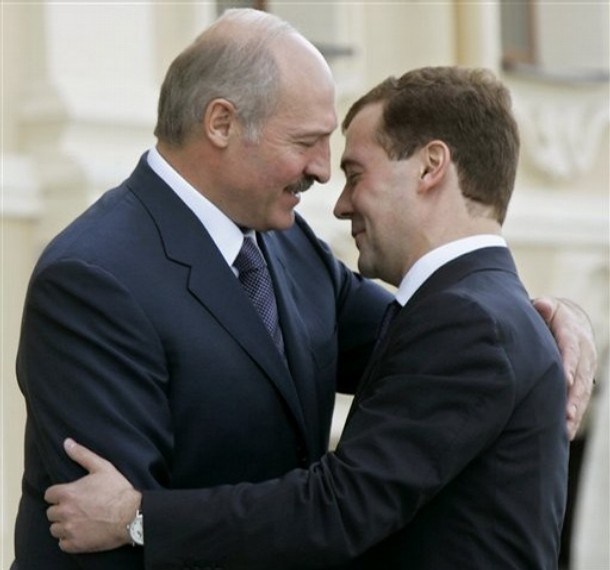
Russia Increases Pressure on Lukashenka
Publication: Eurasia Daily Monitor Volume: 7 Issue: 189
By:

Belarusian President, Alyaksandr Lukashenka, has been trying desperately to offset the impact of a scathing attack on him by Russian President, Dmitry Medvedev, on October 4. Since that time Lukashenka has made conciliatory statements regarding relations with Russia, while at the same time bolstering trade relations with his two main allies, China and Venezuela. However, Russian television has continued its attacks on the Belarusian president, while more scandals have been uncovered at home in the run-up to the presidential election on December 19.
Medvedev’s comments came in response to accusations from Lukashenka that Moscow was interfering in the election campaign by offering support to opposition candidates. Medvedev, through his weekly video blog, made reference to the “hysterical” anti-Russian comments by the Belarusian leader, which he said had broken “not only the diplomatic rules, but the elementary rules of behavior” (https://blog.kremlin.ru/post/111, October 3). The critique was reminiscent of Medvedev’s outburst against former Ukrainian President, Viktor Yushchenko, in August 2009 (EDM, August 13, 2009).
Ironically, Lukashenka has long maintained that Russian hostility toward him emanates solely from the office of Russian Prime Minister, Vladimir Putin, saying that “anything we agree on with the Russian president is not acknowledged by the Russian government” and that he always had a good relationship with President Medvedev (RIA Novosti, June 27). Evidently that is no longer the case.
The rift was further emphasized by a meeting between the head of the Russian presidential administration, Sergey Naryshkin and Belarusian journalists on October 13, prompted by Moscow’s anxiety about the state of relations between the two countries. The majority of journalists, guests of RIA Novosti, represented opposition newspapers and websites. Having referred to the unjustness of Belarusian attacks upon Russia, which he linked to the election campaign, Naryshkin raised the disappearance of Lukashenka’s political opponents in 1999-2000, the main topic of the continuing documentary series Godbatka on Russia’s NTV network (Belapan, October 13).
Two days later, a sensational revelation arose from a lieutenant-colonel in the Belarusian police, Mikalay Kazlou, who provided evidence of “ballot stuffing” during his night watch at a Minsk polling station during the 2008 parliamentary elections. The chairperson of the local election commission requested the keys to the station after it was closed in order to unseal the ballot boxes (evidently not a difficult task) and “throw in” some extra ballots “in support of the official ruler” (Belorusskiy Partizan, October 15). The account is the first real evidence of how elections in Belarus are manipulated in favor of the president.
Russian television channels are remorselessly continuing the assault on Lukashenka. On October 10, Channel One maintained that one psychiatrist had diagnosed Lukashenka as suffering from an “antisocial personality disorder” while a second channel made reference to his psychological profile as exhibiting “sadism, aggressiveness, and unscrupulousness.” The program compared Lukashenka to Adolf Hitler and Josef Stalin (The Moscow Times, October 12).
Lukashenka has responded by announcing a series of agreements with China worth $3.5 billion in credits for joint projects, mainly in the petrochemical industry (www.telegraf.by, October 15). On October 16, Venezuelan President, Hugo Chavez, arrived in Minsk on his fourth visit to declare that his country could provide Belarusian refineries with oil for the next 200 years (RIA Novosti, October 16). However, little good news can be anticipated from Moscow.
October has seen the withdrawal of several electoral candidates, most notably Syarhey Haidukevich, leader of the Liberal-Democratic Party. After gathering the requisite 100,000 signatures needed (the deadline is the end of October) Haidukevich promptly withdrew from the contest, commenting “I do not want to take part in this show. The party has demonstrated that we have the potential, we are active. We will use this activity in another way” (www.charter97.org, October 8). His frustration with the way Belarusian elections are conducted was evident. Haidukevich’s initiative group collected the most signatures as candidates were being registered.
The course of the 2010 campaign has been predictable apart from the outbursts by Moscow. Lukashenka’s team claims to have gathered 600,000 signatures already, leaving the poet, Uladzimir Nyaklayeu, as the only other candidate to have reached the requisite target by mid-October. Through his “Tell the Truth” campaign, Nyaklayeu has already submitted a petition with 25,000 signatures requesting his participation in the so-called All-Belarusian People’s Assembly, which is traditionally a carefully coordinated gathering to approve the president’s future economic plans (www.naviny.by, October 14).
Predictably, the authorities have taken immediate steps to nullify Nyaklayeu’s progress. On October 12, at the request of Minsk city council, a city court deregistered the opposition group “Moving Forward,” which funds the Tell the Truth campaign (Radio Free Europe, October 12). Three days later, the Central Election Commission issued an official warning to Nyaklayeu’s nomination group for alleged electoral violations, including the printing of campaign leaflets in Russia, and the collection of signatures by people who were not group members, or were younger than 18 (Belapan, October 15).
The authorities accuse Nyaklayeu of being Russia’s candidate. In contemporary Belarus this is tantamount to an insult. However, the Russian leaders are becoming increasingly irritated with President Lukashenka’s statements. Thus far they have refrained from direct involvement in the Belarusian election campaign but have indicated clearly that a new leader in Minsk would be far from unwelcome.




